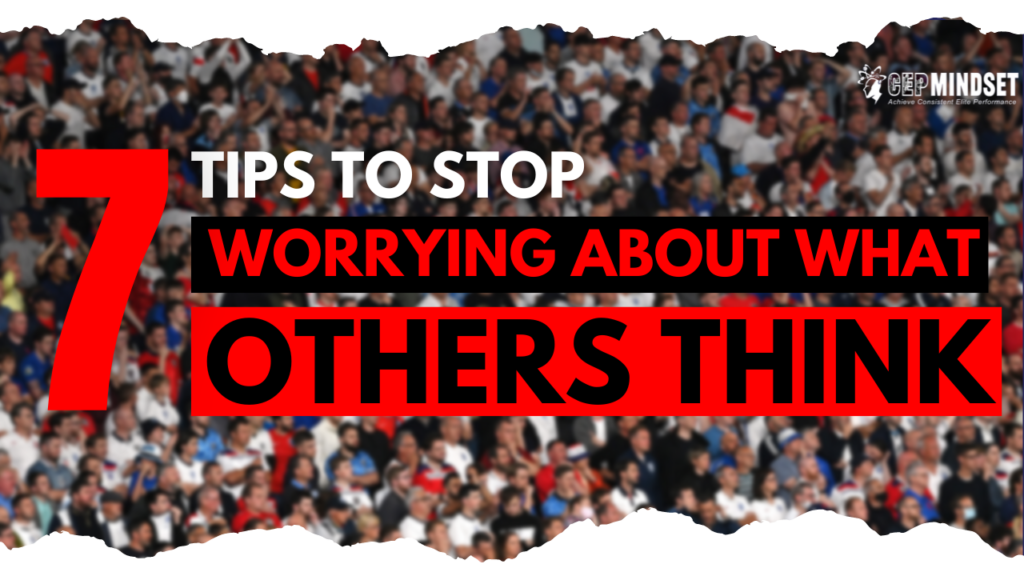
Do you find yourself worrying about what other people think of you?
Are you always seeking approval from others?
If so, you’re not alone. Many athletes and people struggle with this.
As humans, we are naturally concerned with fitting in and being accepted by our peers. This is a survival mechanism that has served us well as a species.
However, in our current reality, this constant need for external validation often holds athletes back from achieving Consistent Elite Performance.
Here are 7 tips, or what I refer to as mental shifts, to help you stop worrying about what others think:
1. External ➜ Internal Confidence
The first tip or mental shift is to stop relying on external sources of confidence and start focusing on internal sources of confidence – where you own your greatness.
The constant worrying about what others think often stems from a lack of confidence.
If you don’t believe in yourself, then you will seek external results and praise. This means you end up excessively worrying about what others think because your confidence is dependent on it.
In case you didn’t realize – external results and praise will never give you the sustainable confidence you are looking for.
Instead, most athletes suffer from yo-yo confidence where their self-belief goes up and down with their results.
The solution is to learn to Play with Confidence by focusing on owning your capabilities. Click here for the full write up and video on how to play with confidence.
Learning how to consistently own your capabilities helps you stop worrying about what others think. You won’t NEED their praise because you will finally be owning your greatness – regardless of what other people think.
This is true confidence.
2. Seeking Approval ➜ Enjoying the Game
This mental shift is about learning how to stop seeking the approval of others so you can get back to fully enjoying the game.
These first two shifts are a nice 1-2 punch that often go well together.
We commonly see athletes struggle with both yo-yo confidence and need for approval, so we want to flip that to owning your capabilities and enjoying the game.
The need for approval is often based on the belief that we can be liked by everyone all the time. That is clearly a fantasy – no one is liked by everyone all the time.
This can be hard to accept because we are biologically wired to want the approval of others. (check out the full article and video on the Reset Routine where we cover the practice of acceptance).
But coming to terms with reality enables us to stop letting the opinions of other people constantly weigh on our mind.
A second reason athletes seek the approval of others is because they confuse their goals with why they play the sport in the first place.
When you were younger you didn’t start playing to get others approval and achieve all these results.
You played because it was fun!
But as you rise the ranks and the stakes get bigger and bigger – you can get consumed with achieving your goals and seeking the approval of others.
There is nothing wrong with pursuing your goals and wanting the approval of others, just don’t confuse external validation as the reason why you play the game.
Your goals and expectations from others are constantly changing and evolving, but why you play remains the same – and you need to stay connected to those intrinsic drivers.
When you do this, you have made the shift from seeking the approval of others to just enjoying the game.
Coincidentally the more you stay connected to the love of the game – the better you will perform.
3. Obsessed with Outcomes ➜ Immersed in the Process
The third mental shift is about moving away from the external scoreboards and towards your own Personal Scorecard.
Instead of getting caught up in society’s definitions of success you want to redefine success based on the things within your control.
The problem is your environment is constantly pushing the external scoreboards. They are easy to measure, everyone talks about them, and there are literally bright lights displaying them everywhere.
As long as you stay obsessed with outcomes you will continue to worry about what others think of you.
The key to letting go is to accept and detach from the results. You can’t become fully immersed into the process if you are still holding onto the results.
The solution is a two step process:
ii) Obsess about your Personal Scorecard
The end goal is to have your process ‘tattooed’ to your mind.
4. Need to Be Perfect ➜ Trusting Your Instincts
People that worry about what others think will often struggle with overthinking. This limiting mindset stems with the need to be perfect.
Perfection comes in different forms for athletes – it could be trying to: please others, be right all the time, or simply avoiding mistakes. Regardless, if you can’t accept that you won’t be perfect all the time then you probably shouldn’t be playing sports.
All sports are some form of failure, learn, adapt, succeed, then repeat. Often with many failures happening before the success.
Instead of getting caught up in the perfectionism trap, make the mental shift to start trusting your instincts.
Don’t try to do what you think is ‘right’ or what other people think you ‘should’ do – this form of judgment will hinder your ability to be in the moment and make effective decisions.
Remember that you know yourself better than anyone else, so trust your instincts and make decisions based on what feels right for you.
You will still make mistakes when you are trusting your instincts, but don’t let that stop you from learning, moving forward, and trusting yourself for the next play.
5. Resist Criticism ➜ Accept & Filter Feedback
Feedback is essential to growth.
But when athletes have a negative relationship to receiving feedback – aka resisting criticism – they not only miss out on the opportunity to grow but it also causes their performance to suffer.
Learning how to accept and filter feedback is a necessary skill. As an athlete you often get a lot of constructive feedback, but some feedback is more useful than others. If you get too much feedback you won’t be able to digest all of it.
It is your responsibility as the athlete to decide what feedback to filter out and what feedback to accept and learn from.
By developing this skill and changing your relationship with feedback, it will help you stop worrying about what others think so you can effectively process feedback and keep playing your game.
6. Staying in a Negative Environment ➜ Intentionally Build a Supportive Team
The events prior to this shift are unfortunately far too common. Whether it be negative coaches or teammates, the sporting culture is generally not creating enough healthy environments.
For more on the toxic culture of sport you can check out two of the recent articles and podcasts I did here: Is Hockey Broken? and The Leaders of Sport are Failing.
Because negativity is so prevalent, it is imperative to intentionally build your support team. Surround yourself with people who support and encourage you. This can be friends, family, or coaches.
Some negative people might be hard to avoid, in those circumstances you want to minimize and filter your interactions with them.
You also want to be mindful of the language and behaviors you tolerate from your friends and family. Instead, passively being at the mercy of those around you, you can be an active agent that is helping to build and shape the environment.
When the opportunities arise you should also be intentional about where you play, what programs you sign up for, and the coaches you decide to work with. As an athlete you are literally creating your own support team.
Quick self plug – adding a CEP Mental Performance Coach can be a great asset to your support team.
7. Take the Backseat ➜ Be the Hero of Your Story
I saved this mental shift for last because as long as you put the opinions of others ahead of your opinion of yourself, you will always be worried about what others think.
You want to respect the opinions of your coaches, your teammates, and parents, but the problem is most athletes are not respecting their own opinion of themselves enough.
Once you decide that you are the hero of your own story and your opinion matters most, you will no longer worry about what everyone else thinks.
A common misconception is that you should not care about what other people think.
Although you might feel like that sometimes and that feeling can be liberating, the reality is you can and should care about what other people think.
The shift is that you stop putting other people’s opinions of you first and start putting your own opinion of yourself as the most important.
The problem is too many people are not being the hero of their own story. They have given away their power and ability to take control of their own life.
Unfortunately, people commonly take a backseat in their own story.
If you are not seeing yourself as the hero of your own story you will struggle to effectively write the next page.
Think of it as a natural part of growing up and maturing. Imagine if you were 45 years old and you were still really worried about what your parents thought. You only did things that your parents approved of – well then it wouldn’t be your life.
Contrast that with a 12 year old. I’m not saying they should just do whatever they want, they are only 12, but I am saying they need to learn how to start thinking for themselves. They need to identify what they want, what matters to them, and they should learn to start taking control of their own story.
If you take one thing from this write up – remember that it is your career and your life, and YOUR OPINION MATTERS MOST.
In summary follow these 7 mental shifts to stop worrying about what others think:
1. External ➜ Internal Confidence
2. Seeking Approval ➜ Enjoying the Game
3. Resist Criticism ➜ Accept & Filter Feedback
4. Need to Be Perfect ➜ Trusting Your Instincts
5. Take the Backseat ➜ Be the Hero of Your Story
6. Obsessed with Outcomes ➜ Immersed in the Process
7. Staying in a Negative Environment ➜ Intentionally Build a Supportive Team
I hope you found these helpful.
Please share with anyone you think would benefit.


 Nicholas Santino is a Senior High-Performance Coach, PhD Candidate, and the official Mental Performance Consultant for Elite Prospects. From his specialized psychology research program, to his PhD studies, Nicholas has gained a tremendous foundation of knowledge and appreciation for the human experience. His passion for psychology has accumulated to a commitment to studying and applying positive psychology and stoicism. This commitment has led Nicholas to conduct many research studies focusing on understanding why and how some people thrive and prosper while others do not. His admiration for evidence-based solutions has propelled Nicholas to produce studies revolving around mindfulness, grit (perseverance and passion), performance, quality participation, social relationships, and well-being.
Nicholas Santino is a Senior High-Performance Coach, PhD Candidate, and the official Mental Performance Consultant for Elite Prospects. From his specialized psychology research program, to his PhD studies, Nicholas has gained a tremendous foundation of knowledge and appreciation for the human experience. His passion for psychology has accumulated to a commitment to studying and applying positive psychology and stoicism. This commitment has led Nicholas to conduct many research studies focusing on understanding why and how some people thrive and prosper while others do not. His admiration for evidence-based solutions has propelled Nicholas to produce studies revolving around mindfulness, grit (perseverance and passion), performance, quality participation, social relationships, and well-being. A Native of Quebec, Sara was part of the St. Lawrence University Women’s Ice Hockey team that competed in the NCAA Division 1 hockey league ECAC. During this time, Sara helped her team appear in four ECAC Hockey Tournaments and two NCAA Frozen Fours, and was a four-time member of the ECAC Hockey All-Academic Squad. Following her career at St. Lawrence University, Sara played one year of professional hockey with Lugano, where she truly honed her skills in understanding the intricate connection between mindset and performance.
A Native of Quebec, Sara was part of the St. Lawrence University Women’s Ice Hockey team that competed in the NCAA Division 1 hockey league ECAC. During this time, Sara helped her team appear in four ECAC Hockey Tournaments and two NCAA Frozen Fours, and was a four-time member of the ECAC Hockey All-Academic Squad. Following her career at St. Lawrence University, Sara played one year of professional hockey with Lugano, where she truly honed her skills in understanding the intricate connection between mindset and performance.
 Blair has over 13 years of experience as a Professional Dancer, Assistant Dance Captain & Cast Manager, as well as an additional 17 years of training. Over the last 3 decades, she has lived and experienced first hand the highest of highs & lowest of lows that come with pursuing a career in the Performing Arts.
Blair has over 13 years of experience as a Professional Dancer, Assistant Dance Captain & Cast Manager, as well as an additional 17 years of training. Over the last 3 decades, she has lived and experienced first hand the highest of highs & lowest of lows that come with pursuing a career in the Performing Arts.













